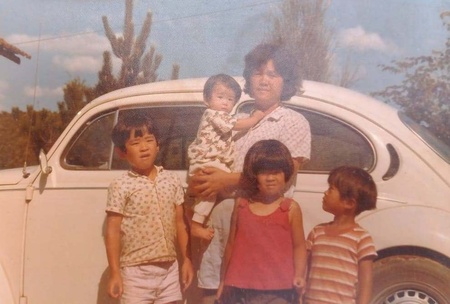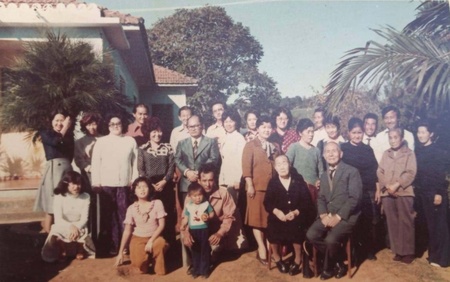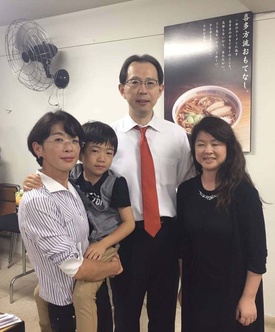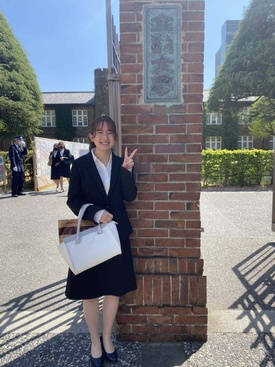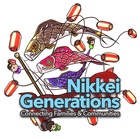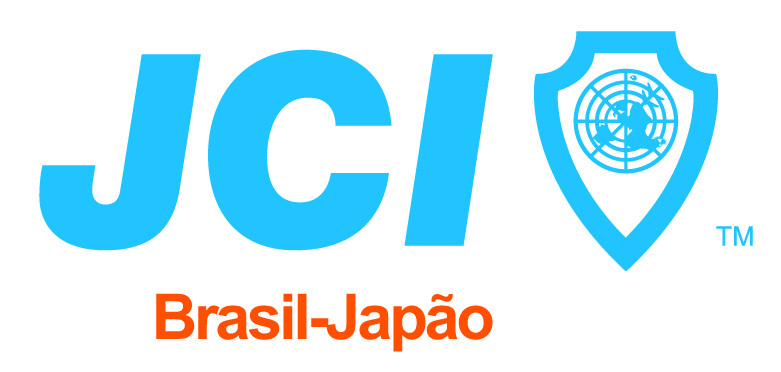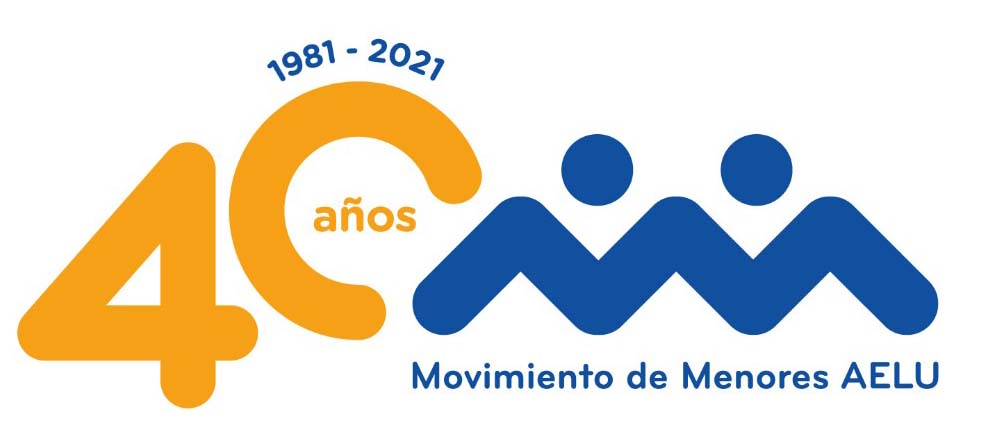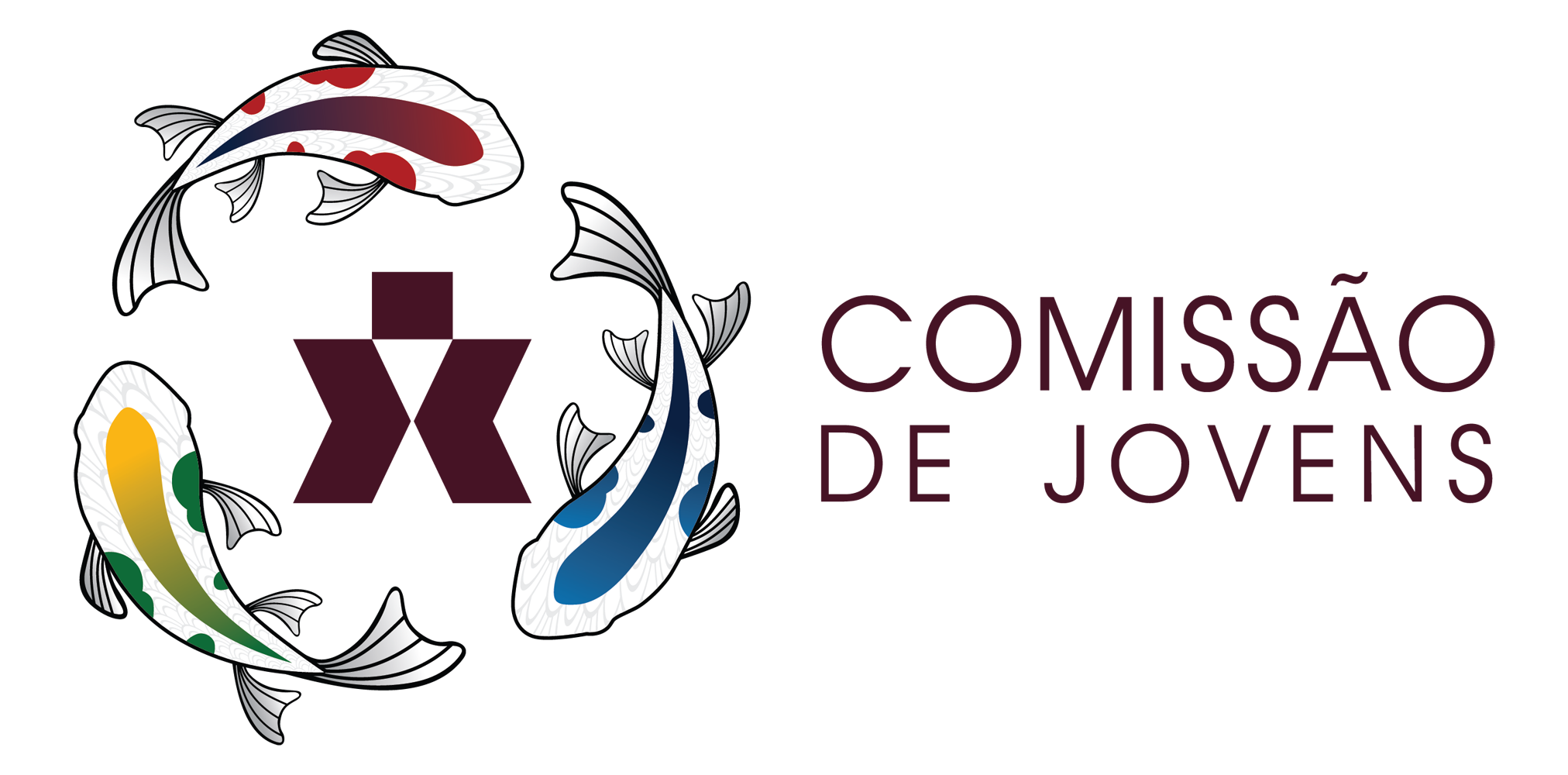Since I was born, my Obachan said that we would have to speak Nihongo because we looked Japanese, despite being born in Brazil. We would be Japanese our whole lives. But, I didn't understand why we would have to speak Nihongo at home when we lived in Brazil.
We are 4 brothers and we all entered primary school without speaking any Portuguese and I clearly remember that I suffered a lot, but today, I am very grateful for the education they gave us. In the morning, burajiru gakkou and in the afternoon, nihongo. We spent the whole day at school and my Otochan always said that we would have to study, because he couldn't. His dream was to go to college, but this could not be realized because of the war.
Before the war, my Otochan had a very comfortable life. My Hiojichan (great-grandfather) worked as a police officer in Shinagawa. However, everything changed after the war. With Japan devastated by war and because of the noochi kaikaku (agrarian reform at the time), they had to move to Namie, in Fukushima, so as not to lose the land they owned there. And as my Hiojichan had never worked on a farm, it was a difficult time even to eat. Because of the family's economic situation, my Obaachan decided that she would immigrate to Brazil when she saw a kairanban (notice from neighborhood residents), saying that she would have a better life in Brazil, "the land of dreams".
Arriving in Brazil, they had to work hard in the coffee plantations in the interior of São Paulo. My Otochan always told us about the hard life at that time and the discrimination we suffered. And in my childhood, I remember that everyone called us “Japanese”. It was difficult for a child to understand. Today, the opposite happens, because I live in Japan and here I am considered gaijin .
Since I was little, I was very interested in Japan and whenever possible, we always participated in the Fukushima Kenjinkai, which is located in Liberdade. I was very interested in getting to know Japan and the first step was to try kempi ryugakusei. At the time, everyone my age spoke Nihongo very well and the competition was very high, around 20 people for 3 places.
Fortunately, I managed to pass Fukushima College. Arriving in Japan, I was shocked that my nihongo wasn't enough or rather it was an old nihongo . Here, amid the westernization of Japan, many English words adapted to Nihongo were quite common in everyday life. It was a cultural shock, since the nihongo practiced in Brazil did not follow the evolution of modern nihongo . Despite everything, the nihongo base I had was very important for my adaptation. When you have the basis of a language, the rest is just a matter of adjustments.
At the time, I had an incredible experience at one of the meetings with other scholarship holders from Brazil in Tokyo, when Tennoheika came to welcome us! Seeing Japan's most important figure up close, which for most people was only possible to see on television, my adrenaline was in overdrive.
To better understand Japanese culture or any other culture, you can only live with the local people. I also discovered that it's no use just speaking Nihongo , but you need to understand the essence of the language and the entire history of each sentence construction. To have better involvement, I have been teaching Portuguese to Japanese for over 20 years.
There are companies that ask you to learn Portuguese in 3 months. A difficult mission, but not impossible, because today there is the Internet, and most company employees speak English.
In the first Portuguese classes for Japanese students, I always try to start with the cultural part of Brazil, going into History a little so that they can better understand the Brazilian Portuguese language. I have Japanese students who love Brazil and that makes me very satisfied and proud.
Here in Japan there are many neologisms that the Nikkei created within the Brazilian community. For example, the word “ gambateando ”, which is one of the most common used here. The language is alive and is always changing, following changes in customs, fashion and other trends of the time, and new words are often not found in dictionaries.
An important fact I wanted to highlight is that most Japanese people don't know what a Nikkei is. After the post-war immigration movement, it is clear that these are topics that are not touched on by public entities and in schools. Even for my daughter to understand it was difficult, as the history of Japanese immigration abroad seems to be a taboo, a shameful thing that Japan prefers to hide rather than show that immigrants made a huge contribution to the various societies in which they were inserted. over the years. She asked me if I was Japanese or Brazilian. Today, I think it is not a relevant point, because what really matters is character.
Living here in Japan for so many years, an interesting story I experienced was when my daughter was at shougakkou and had a friend who suddenly stopped talking to her. And my daughter didn't understand why. I soon imagined that it was because we didn't behave according to Japanese customs. That's when I decided that I would participate in all school meetings and make friends with the mothers, to show that we are decent people. And so, I dedicated myself to educating my body and soul so that my daughter would not be ashamed of being the daughter of Brazilian parents.
I learned a lot from my daughter, when she practiced Kendo , which has a whole ritual, and this was very important for her life: learning to lose and win, having sempai (who is born first) and kouhai (who is born first) relationships. after).
I remember that in Kendo , mothers called some by their first name and others by their last name and I didn't understand why. I discovered later that this depends on the degree of friendship. When it's a friend, call her by her first name and not her last name. In my case, with a lot of dedication they started calling me by name after 2 years.
As for the practice of Kendo , I discovered that the child has to combine studies with some type of sport, to make them have perseverance and interaction with people, learning things that studying alone would not be enough.
I dedicated a lot to my daughter's education. I've always said that, when you decide to start something, you have to see it through to the end. Never give up. But, if you reach your limit, which I believe everyone has at this point, it would be time to think.
When the earthquake occurred in 2011, Fukushima prefecture was the most affected due to one of the nuclear plants exploding, releasing a very high level of radiation. The city of Namie, where my Otochan lived, was so affected that it ended up being closed and no one could enter there anymore. The relatives who lived there lost their homes and I have an aunt who still suffers from depression today. The people of Fukushima suffered a lot of discrimination due to radiation and she said that they scratched her car just because it had a Fukushima license plate.
Three years ago my parents came to Japan for a walk and a cousin took us to the city of Iwaki, where the tsunami swallowed the city. It was very shocking! For the first time, my Otochan said that the best thing he did was go to Brazil and that he loves it there.
One of my greatest prides was that my daughter entered one of the best colleges in Japan, Rikkyo University, this year. When I told my Otochan the news, he was very happy, saying that this school is very famous and renowned. In a way, my daughter fulfilled the dream of my Otochan , who had not been able to complete his studies here.
As Nikkei, we have a responsibility to maintain the culture that our ancestors left us. But in my opinion, this is increasingly difficult. Many are no longer interested, they rush to study English, which is easier to learn compared to Nihongo . We have to change this little by little. Due to the ease we have with the Internet today, the interest that many young people have in anime and manga is increasing more and more. But it still leaves a little to be desired.
Being Nisei, I believe that it is easier for me to feel the closeness of the stories that my Otochan told and still tells today. And I always try to encourage my nephews to study nihongo , since they look Japanese. Therefore, I believe that everyone participating or doing a little for the community would be a big step towards not losing our cultural heritage, which is very valuable. The more I delve into this ancient culture, the more I fall in love with it.
© 2021 Amélia Hisami Karuka Shoji


